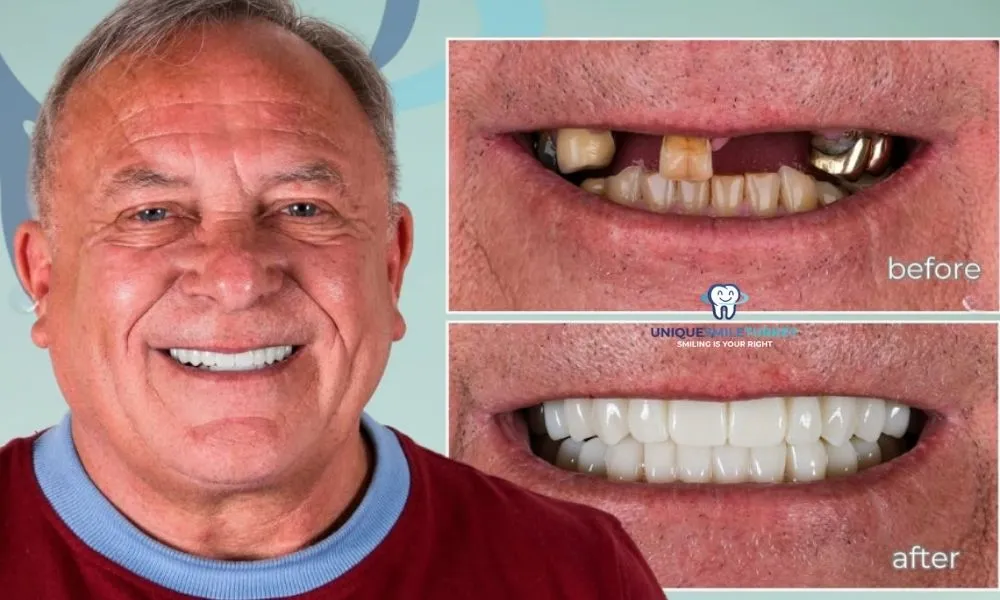


Getting a dental implant Turkey is more than just fixing a missing tooth, it's the beginning of a fresh, confident smile. And just like any good beginning, what you do in those first few days matters. A lot. Knowing how to care for it can make all the difference.
You don't need to panic, overthink, or search the entire internet. We've gathered everything you actually need in one place, clear, gentle, and backed by experience.
Take a deep breath. You've done the hard part. Now let's focus on healing.

So, how can you help your body heal faster?
Simple steps, done the right way, can make your recovery smoother, shorter, and way more comfortable. Let's walk through the 10 most effective tips designed to protect your new implant and get you back to smiling with ease.
After getting a dental implant surgery, rest isn't just a suggestion, it's a must. Your treatment has just gone through a surgical procedure, even if it was done in a dental chair. That implant placed in your jaw is like a foundation stone. For it to settle properly, everything around it (your bone, gums, and soft tissue) needs time to start healing. And that fast dental implant healing demands energy.

When you rest, your body can fully focus on repairing the tissues and reducing inflammation. Think of it like a construction site. If workers keep getting distracted with side jobs, the main project drags on. But when all the focus is on one task—healing—the results come faster and cleaner.
Especially in the first 48 hours, rest helps reduce the risk of complications like swelling, bleeding, or even implant failure. During this time, avoid physical activity, don't bend over or lift anything heavy, and don't schedule intense work. Even long phone calls, stress, or loud environments can take a toll.
Scientific studies also highlight this. According to a publication in the Journal of Oral Implantology, postoperative rest directly improves the stability of implant in the early healing phase by minimizing micro-movements that could interfere with osseointegration the process where implant fuses with the bone.
So, for at least two to three days, take it slow. Lie down with your head slightly elevated, avoid talking too much, and let your body focus on healing. A little patience now could save you from big problems later.
After a dental implant, your mouth needs calm, not just from movement, but from food too. That's why soft foods are your best friend in the first days. They don't press or pull on the implant area, which helps avoid pain, bleeding, or damage to stitches.
But here's the key: soft doesn't mean weak. You still need strength-giving foods rich in protein, vitamins, and healthy fats because healing uses a lot of energy.
Go for mashed potatoes, scrambled eggs, smoothies, soups, soft fruits, or yoghurt. These support your body while being gentle on the surgical site.
Avoid anything crunchy, sticky, spicy, or too hot. Foods like nuts, chips, crusty bread, or acidic sauces can irritate or even reopen the wound.
A study in the Open Dent Journal highlights that high-protein diets help tissues heal faster and support the bone around the implant.
After a dental implant Antalya, the area is sensitive. Hot food or drinks can increase blood flow and cause bleeding or swelling. Cold options can also shock the tissue and slow healing.
That's why warm, not hot, not cold, is the safest choice.
Lukewarm soups, soft veggies, or herbal teas soothe your mouth without irritating the implant. Just let things cool a little before eating or sipping. It's a small step, but it makes healing easier and more comfortable.
Just because you had surgery doesn't mean you should stop brushing your teeth. In fact, home care after dental implant surgery is one of the most important things you can do. But you need to do it gently and smartly.
In the first couple of days, avoid touching the implant area. Brush the other parts of your mouth as usual, using a soft-bristled toothbrush and slow, careful strokes. After about 3–5 days, when the initial healing starts, you can begin gently cleaning near the implant, unless your dentist told you otherwise.
Skipping oral hygiene can lead to a buildup of bacteria and bacteria are a healing implant's worst enemy. They can cause infections in the gums and slow down the bonding process between the implant and the bone.
Also, avoid strong mouthwashes with alcohol. They may sting and irritate the tissue. Instead, use lukewarm saltwater rinses or a dentist-recommended gentle rinse.
According to the European Journal of Dentistry, patients who maintain better oral hygiene after implant surgery have higher long-term implant success rates. Regular, gentle cleaning lowers inflammation and supports gum health, two things your implant needs to thrive.
So, don't stop your routine. Just go slower, softer, and be kind to your healing mouth. Clean mouth, clean recovery.
Salt water might sound basic but it works wonders after dental surgery. It gently cleans your mouth, calms swollen gums, and helps the area heal faster. No alcohol, no sting, just natural support for your body.
Mix a teaspoon of salt into a glass of warm water. Rinse slowly, let it move around your mouth, then spit it out. Do this two to three times a day, especially after eating.
Does something so simple really help? Yes. It's like giving your healing gums a warm bath. No pressure, no harsh swishing. Just gentle care after implant treatment. Your implant site will thank you.
Swelling? Totally normal. But you can manage it easily with ice. Cold slows down swelling and eases pain. It's quick relief and it actually helps the healing process.
Wrap some ice (or frozen peas) in a clean cloth and press it gently to your cheek. 15 minutes on, 15 minutes off. Do this several times on the first day.
Most people who use ice early feel less pain and recover faster.
Healing takes energy and water helps deliver it. Staying hydrated keeps your tissues soft, supports cell repair, and washes away bacteria.
Thirsty or not, sip water often.
Skip sugary drinks, soda, or alcohol. They dry out your mouth and slow recovery. Plain water is your best friend right now. It's simple but powerful.
Just follow your dentist's instructions. If you were given antibiotics, it's to stop infection before it starts. Painkillers? They help you sleep, eat, and stay relaxed. And that helps you heal.
Feel okay, so skip a pill? Bad idea. Infections can grow quietly.
One PubMed study found early infection is a major reason implants fail. So don't stop your meds early. Take every dose. Protect your implant.
It feels strange, right? There's something new in your mouth, and your tongue naturally wants to explore. But don't. Even light pressure can interfere with the healing process. That gentle poke or tiny brush might seem harmless, but to a fresh implant, it's a problem.
Avoid touching the area with your fingers. Don't pull your lip to ‘check' how it looks. And when brushing, stay far from the implant zone for a few days. Just focus on the rest of your mouth until your dentist says it's okay to clean near the site.
Why leave it alone?
Because it's like planting a seed. You don't dig it up to see if it's growing. You let it rest.
The same goes for eating. Try not to chew on that side for at least a week. Choose soft foods and use the opposite side of your mouth. Even one strong bite on the implant area can slow down healing or worse, loosen it.
So, treat it like something precious. Don't test it. Don't disturb it. Keep the area clean, still, and protected. The less you mess with it, the better your body can do its job. And in a few weeks, that small effort will pay off big.
If there's one thing that slows healing after a dental implant, it's smoking. And alcohol isn't much better. Both create a hostile environment in your mouth when your body is trying to repair itself.
Nicotine reduces blood flow to the gums. That means less oxygen, fewer nutrients, and slower healing. Worse, it increases your risk of infection and implant failure. Studies show that smokers have double the risk of implant loss compared to non-smokers.
Alcohol dries out your mouth and can interfere with your medication especially antibiotics and painkillers. It also weakens your immune response. So, taking a break from both for at least 7–14 days can make a huge difference.
The short answer? It depends. But generally, the full healing process takes about 3 to 6 months. That's how long your bone needs to fuse with the implant, a process called osseointegration.
That said, most people feel better within a few days. Swelling, discomfort, and minor bleeding usually calm down by day three. You'll be back to eating soft foods comfortably within a week.
So, when is the implant fully settled?
Usually by month three, but for some, it can take up to six.
Healing speed depends on your age, health, bone quality, and how well you follow post-op care. Smokers, diabetics, or those who don't rest or eat properly may take longer.
Think of it like concrete setting. It might look fine after a few hours, but you wouldn't build a house on it yet. Same with implants. Let it bond strong before the crown is placed.
Exercise raises your heart rate and increases blood flow. Sounds healthy, right? Usually, yes. But after a dental implant, it can trigger bleeding, cause swelling, or disrupt the clot forming around the wound.
The first 2–3 days are the most sensitive. That's when your body is trying to form a stable foundation around the implant. If you jog, lift weights, or even do intense yoga, the increased pressure can break that delicate balance.
Even walking too fast? If it raises your pulse too much yes, it can be a problem. So, skip the gym, sports, and heavy lifting for a few days. Rest isn't laziness, it's smart healing. After a week, gentle activity may be okay, but always ask your dentist first.
Why Unique Smile?
At Unique Smile Turkey, dental implants aren't just a procedure they're a promise. A promise of advanced technology, personalized care, and results that look and feel natural. From your first consultation to your final check-up, we guide you every step of the way with honesty, comfort, and precision.
Prof. Sinan Tozoğlu leads our team with years of experience in implantology and a passion for creating confident smiles. His expertise isn't just in surgery, it's in listening to your concerns, understanding your needs, and delivering care that feels personal.
Got questions? Wondering if dental implants are right for you?
Contact now and speak directly with Prof. Sinan Tozoğlu. Unique Smile Turkey Antalya will help you understand your options and guide you toward a treatment that fits you.
Note: This blog post does not contain diagnosis and treatment; it is written for informational purposes only.